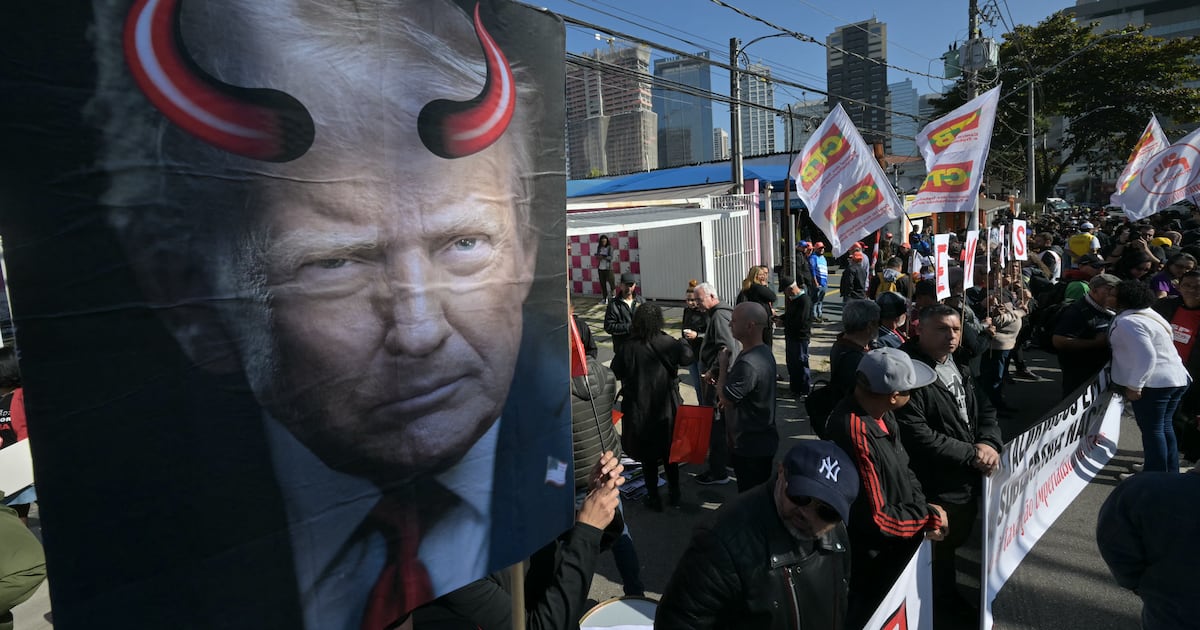Politics
Trump Claims Victories Amid Trade Deals and Golf Controversy

This week, Donald Trump faced renewed accusations of cheating during a golf game at a Scottish course, where video footage suggested an aide was caught repositioning a golf ball to improve his lie. This incident adds to the ongoing discourse about the negotiable nature of rules in both golf and politics, where perception often outweighs process.
Economic Claims Amid Controversy
Despite the golf controversy, Trump experienced a moment of optimism, bolstered by the announcement of two significant trade agreements—one with the European Union and another with Japan. These deals have allowed him to assert that his unconventional approach to international trade is yielding positive results. Trump has consistently maintained that the global trading system disadvantages the United States, arguing that a combination of tough rhetoric and tariffs is necessary to correct this imbalance.
While many mainstream economists have raised concerns about potential retaliation, inflation, and job losses as a result of his policies, recent economic indicators have not yet confirmed these fears. Stock markets remain stable, and opinion polls indicate that Trump is regaining public confidence in his economic management.
Emboldened by this perceived success, Trump announced broader tariffs on Friday, targeting nations such as Canada and Brazil, which he claims have exploited American goodwill. Alongside this, he has indicated a potential shift in policy towards Russia, threatening new sanctions unless progress is made regarding the ongoing conflict in Ukraine.
Emerging Economic Concerns
Despite these optimistic developments, troubling signs are beginning to emerge. Revised labor market data shows a notable slowdown in job creation over the previous quarter. This follows a disappointing report on GDP, indicating that consumer spending, a critical element of US economic growth, is weakening. With the Federal Reserve set to meet in September, it may need to reconsider its stance on interest rates.
The broader economic landscape remains uncertain. Key details regarding the newly announced trade agreements are yet to be finalized, and timelines for implementation remain vague. Thus far, Trump’s tariff strategies have primarily introduced uncertainty into the global marketplace, with potential repercussions for economies like Ireland. The Irish Department of Finance recently warned that the latest round of US tariffs could lead to a reduction of up to 70,000 jobs in Ireland over the next five years, presenting a significant threat to the nation’s economic stability.
While this period of relative calm may give Trump a sense of victory, the unpredictability of his presidency raises concerns. If impulsive decisions, personal grievances, and abrupt shifts in policy continue to characterize his administration, the current sense of stability may prove to be temporary. In both politics and golf, the ultimate outcome is determined not by the start, but by where the ball finally comes to rest.
-

 Top Stories3 months ago
Top Stories3 months agoTributes Surge for 9-Year-Old Leon Briody After Cancer Battle
-

 Entertainment4 months ago
Entertainment4 months agoAimee Osbourne Joins Family for Emotional Tribute to Ozzy
-

 Politics4 months ago
Politics4 months agoDanny Healy-Rae Considers Complaint After Altercation with Garda
-

 Top Stories4 months ago
Top Stories4 months agoIreland Enjoys Summer Heat as Hurricane Erin Approaches Atlantic
-

 World5 months ago
World5 months agoHawaii Commemorates 80 Years Since Hiroshima Bombing with Ceremony
-

 Top Stories3 months ago
Top Stories3 months agoNewcastle West Woman Patricia Foley Found Safe After Urgent Search
-

 Top Stories5 months ago
Top Stories5 months agoFianna Fáil TDs Urgently Consider Maire Geoghegan-Quinn for Presidency
-

 World5 months ago
World5 months agoCouple Convicted of Murdering Two-Year-Old Grandson in Wales
-

 World5 months ago
World5 months agoGaza Aid Distribution Tragedy: 20 Killed Amid Ongoing Violence
-

 World5 months ago
World5 months agoAristocrat Constance Marten and Partner Convicted of Infant Murder
-

 Top Stories4 months ago
Top Stories4 months agoClimbing Errigal: A Must-Do Summer Adventure in Donegal
-

 Top Stories4 months ago
Top Stories4 months agoHike Donegal’s Errigal Mountain NOW for Unforgettable Summer Views









